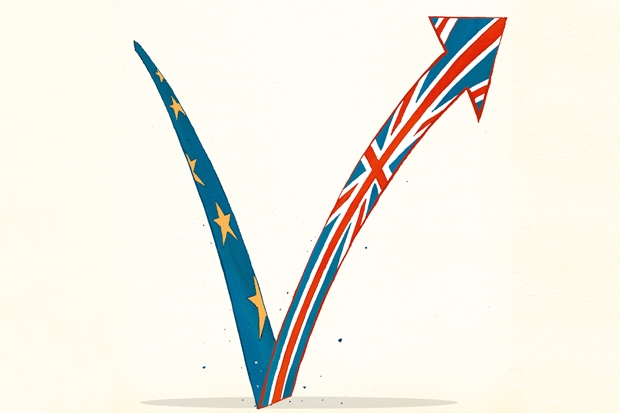A hard Brexit, currency markets seemed to indicate yesterday, would mean an even weaker pound. How, then, to explain this afternoon’s surge in sterling, which surged from just over $1.20 to just under $1.24 within a couple of hours of Theresa May’s speech? The rise more than reversed the falls since Monday morning, when the contents of the Prime Minister’s speech first became apparent. In other words, the market for sterling seemed to fear hard Brexit, but when it got hard Brexit it turned jubilant.
Some have interpreted the rise as a reaction to Theresa May’s announcement that once the Brexit deal has been done it will be subject to a vote by both Houses of Parliament – the idea being that MPs and lords might vote down the deal and we can all go back to happily being members of the European Union. Yet however Remainers might like to comfort themselves with this thought, it doesn’t make sense. There was always bound to be a Parliamentary vote on the terms of Brexit, just as there will have to be on repealing the European Communities Act. It is hardly as if the PM had announced a second referendum. In any case, sterling began to rise before Mrs May reached that section of her speech – and indeed before she made her speech at all. It had been rising since breakfast time.
Another explanation for sterling’s gyrations over the past 48 hours: that while some investors fear a hard Brexit, others are looking to the opportunities that will be brought about by May’s promise to get cracking on trade deals with countries outside the EU. Donald Trump’s suggestion that he wanted to do a quick trade deal with Britain ought surely to be taken as good news.
But a better explanation, I suspect, is something quite different: that markets are often irrational and it makes little sense in trying to pin their every move on logical reasoning. It has become very fashionable in recent years to champion the supposed wisdom of crowds, but there is seldom a lot of wisdom to be found in financial markets, currency ones especially. The real reason for the pound’s fall since July is not Brexit but that it had been mispriced for several years. You only had to look at Britain’s gaping trade gap to see how over-valued it had become. Brexit was the trigger for the correction, but no more than that.
There is nothing in this week’s news which would explain the dramatic changes in the pound’s fortunes. It is more a case of investor psychology. When markets plunge they so often do plunge into one, last steep chasm before rebounding equally sharply. It happened to stock markets in 2003 and 2009. Trying to look for wisdom in these cycles of panic and euphoria is futile. But it may just be a sign that the correction in sterling has run its course.







Comments